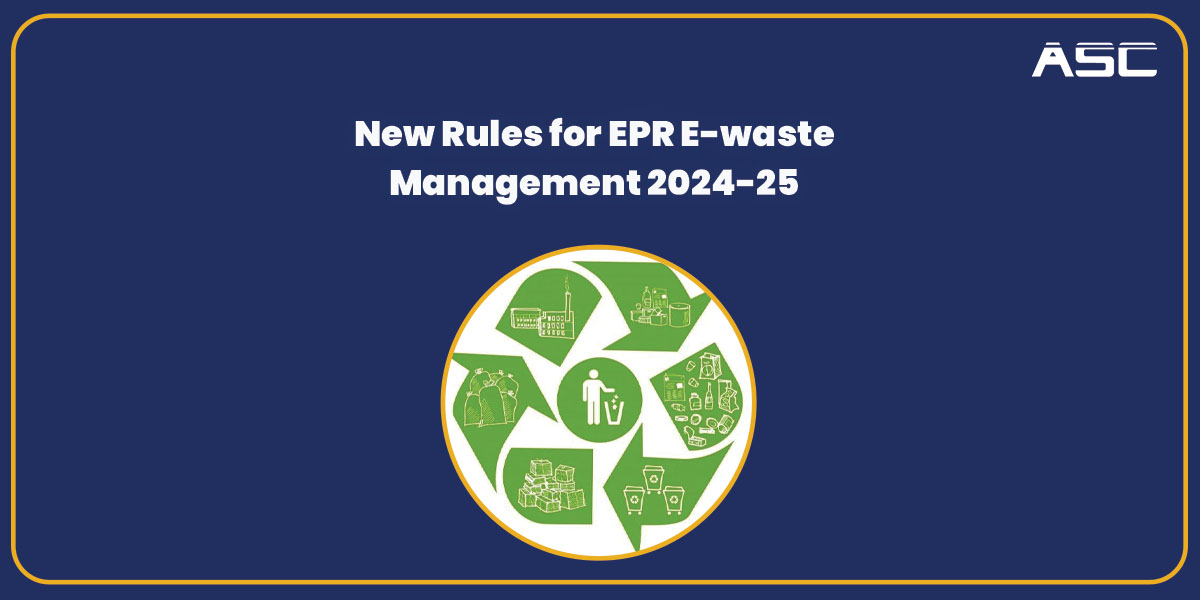New Rules for EPR E-waste Management 2024-25 | Latest EPR Updates

Extended Producer Responsibility (EPR) focuses on placing responsibility for environmentally sound behaviour on the manufacturers, producers, refurbishers, recyclers etc. The government recently came up with the E-Waste (Management) Rules, 2022 which will come into force from 1st April 2023. These rules highlight the EPR for e-waste management framework for those dealing in the sale, manufacture, purchase, transfer, dismantling, refurbishing, processing or recycling of e-waste including their parts and components.
However, these shall not apply to the following:
- Waste batteries
- Packaging plastics
- Micro-enterprises
- Radioactive wastes
Let’s decode the new rules for EPR e-waste management in detail.
CHECK LATEST BIS & EPR UPDATES HERE
New E-Waste Management Rules – Key Highlights
Following are some of the key highlights of the new EPR e-waste management rules that will come into force from 1st April 2023.
1) Registration for EPR E-Waste in India
Any entity that falls in the below category shall be required to apply for EPR registration
- Manufacturer
- Producer
- Recycler
- Refurbisher
Such entities are not allowed to carry on business without obtaining EPR registration. Further, these entities are not allowed to deal with unregistered manufacturers, producers, recyclers and refurbishers.
2) Responsibilities and Compliances for E-Waste By Registered Entities in India
Certain responsibilities have been placed on the registered entities pertaining to e-waste management. Primarily, these entities should get themselves registered with the CPCB on the portal. Apart from this, the following are the entity-wise responsibilities and EPR compliances for e-waste placed by these rules:
|
Registered Entities |
Responsibilities and Compliances |
|
Producers |
|
|
Manufacturers |
|
|
Refurbishers |
|
|
Recyclers |
|
|
Bulk Consumers |
|
Apart from the above, the above entities (except bulk consumers) are required to file annual returns as well as quarterly returns on or before the end of the month succeeding such year or quarter to which the return relates.
CHECK LATEST BIS & EPR UPDATES HERE
Products on Which E-Waste Management Rules Apply
The products on which e-waste management rules apply can be bifurcated into two categories:
a) Consumer Electricals and Electronics
- LED and LCD Television Sets
- Washing Machine
- Refrigerator
- Fluorescent and other Mercury-containing lamps
- Air-Conditioners excluding Centralized Air Conditioning Plants
b) IT and Telecommunication Equipment
- Centralized Data Processing systems like Mainframes, Personal Computers, Mini-Computers, Notebook Computers, Laptop, Notepads and related accessories
- Printers and related components
- Copying Equipment
- Electrical and Electronic Typewriters
- User Terminals and Systems
- Telephones
- Cellular Telephones
- Cordless Telephones
3) Storage of E-waste
Any manufacturer, producer, recycler or refurbisher can store the e-waste only for a period of up to 180 days. They are required to maintain the record of the sale, transfer or storage of e-waste. These records shall be provided to the relevant authorities in case of any inspection. However, the Central Pollution Control Board (CPCB) has the power to extend the period of storage up to 365 days in case the e-waste needs to be stored specifically for the development of a process for recycling or reuse.
4) Extended Producer Responsibility Certificates for E-waste
The producers are required to fulfill their extended producer responsibility obligations as per Schedule-III and Schedule-IV. Such obligations shall be discharged through the online purchase of certificates from registered recyclers. This shall be submitted online by the filing of quarterly returns. The CPCB in favour of either the recycler or refurbisher shall generate these certificates.
a) Recycler: In the case of recyclers, the CPCB shall generate the certificates through the portal. These certificates shall be in the denomination of 100, 200, 500 kgs etc. as the CPCB may decide. The quantity for the certificates shall be calculated as follows-
QEPR = QP x Cf
Where,
• QEPR = Eligible quantity for the generation of the certificate
• QP = Quantity of the end product
• Cf = Conversion factor (quantity of inputs required for generating 1 unit of output)
The conversion factor shall be determined by the CPCB. The certificate shall be valid for a period of 2 years from the end of the financial year from which the certificate was generated.
b) Refurbishers: Refurbishers are also required to get registered on the portal. By purchasing the certificates from the refurbishers, the producers can defer their extended producer responsibility by the duration as laid down by the CPCB for the respective quantity of the e-waste. It should be added to the EPR obligations of the producer upon the expiry of the extended life of the refurbished product. However, the obligation shall end only after the end-of-life disposal through a registered recycler and by producing the EPR certificate and not the refurbished certificate.
5) Reduction in Use of Hazardous Substances
The producers of the electrical and electronic components, parts or consumables shall ensure that the new electrical and electronic components, parts or consumables shall not contain hazardous substances like Mercury, Lead, Cadmium, Polybrominated Biphenyls and Hexavalent Chromium, Polybrominated Diphenyl Ethers. Proportions have been specified for these substances and their concentration should not exceed such proportions. A maximum concentration value of 0.1% by weight is allowed for homogenous materials like Mercury, Lead, Polybrominated Biphenyls and Hexavalent Chromium, Polybrominated Diphenyl Ethers and 0.01% by weight is allowed for homogenous materials like Cadmium.
In a Nutshell
Extended Producer Responsibility for e-waste management is one of the key ways to keep environmental pollution in check. It primarily focuses on the end-of-life disposal of the products to ensure that it does not have a lasting harmful impact on the environment. With a proper disclosure and e-waste compliance mechanism in place, it has become important for the registered entities to ensure compliance with the relevant regulations. In case you need any assistance in relation to the EPR registration in India or compliances, feel free to contact the ASC Group.
Also Read: Guide on Extended Producer Responsibility Certification -EPR Authorization in India

Leave a Reply